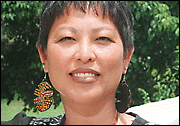

![]()
View Point


![]()
View Point
UNIVERSITY of Hawaii President Kenneth P. Mortimer has successfully starved the UH School of Public Health almost out of existence. The school's accreditation will lapse on June 5, 2000, with dire results for not only for its students, but for the people of Hawaii, the Pacific Rim and parts of Asia. UH school keeps
Hawaii healthyEveryone stands to lose if this happens. We need to put a face on this dying entity so it becomes less of an anonymous victim.
The following are a few reasons why the UH School of Public Health is so important:
Its epidemiology specialists enable the state to forewarn the population about emerging infectious disease outbreaks and chemical and biological threats. It is currently working with the state Department of Health on the salmonella outbreak and a plan to eradicate tuberculosis in Hawaii by the year 2010.
Environmental and occupational health specialists enable the state to assess the effect of pesticides and other noxious agents in the food supply and assure the health safety of recreational waters.
Its specialists assess the health needs of women and children, and help them receive appropriate and high-quality care. Its studies revealed fetal alcohol syndrome as the highest cause of child retardation in Hawaii. In conjunction with the DOH, it helped initiate the "Never Shake a Keiki" program and fueled the current trend of promoting breastfeeding.
Folding it into the UH School of Medicine will mean all potential public health students will have to seek their degrees outside of Hawaii.
It maintains a higher percentage of students of Hawaiian/part-Hawaiian, Filipino, Pacific Island and Native American/Alaskan native ancestry than all other UH graduate programs.
Its work with the DOH has gained a national reputation as a model for public health practice. This includes needs assessments, evaluation of programs and specific research projects, such as the effect of volcanic air pollution and its link to asthma in Hawaii; cumulative trauma disorders; comparative mortality among full-, part- and non-Hawaiians; leptospirosis; and substance-abuse patterns. It is also currently conducting studies on mercury sediments and other pollutants in the Ala Wai Canal, and on soils and streams of the greater Honolulu watershed.
It has one of the top four biological and chemical terrorism programs in the U.S.
THE UH administration is endangering the future of health care in Hawaii and the Pacific by deciding to close the school or moving pieces of it into the School of Medicine. There is no proof that any money would be saved by doing this. The preponderance of evidence suggests the opposite.
There has been an active campaign to discredit the school. It has been publicly stated that the school is ranked dead last in national accreditation standings. This is untrue because no such ranking exists.
It is said that the school can't handle its weight academically or fiscally, although it has been cut by 34 percent as compared to average cuts of two-sixteenth for other departments.
It is said that the school can easily be folded into a program in the School of Medicine. But the accreditation organization, the Council on Education for Public Health, has indicated that the school's curriculum could NOT be simply changed to a "program of public health" and be accredited. Additional resources would be necessary.
Finally and most important, decisions that will impact or seriously jeopardize the health of the community must always be made with community input.
C. Mamo Kim is president of the Graduate Student
Organization at the University of Hawaii.
UH School of Public Health Library
Ka Leo O Hawaii